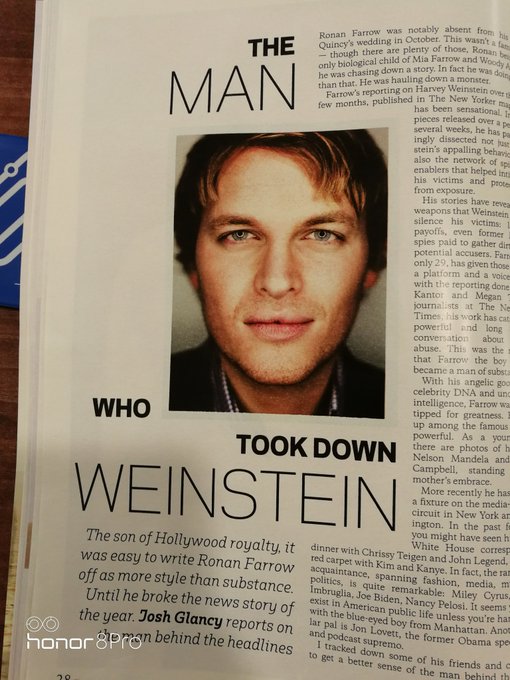The women reporters who sparked the #MeToo movement are already being written out of the story
Over the weekend, Britain’s Sunday Times ran a profile of Ronan Farrow — “the man who took down Weinstein.” While Farrow’s reporting certainly played a major role in exposing the Hollywood producer’s past sexual misconduct, it was two women reporters at the New York Times, Jodi Kantor and Megan Twohey, who broke the story. And they’re already being written out of it.
On October 5, the Times published an exposé, written by Kantor and Twohey, alleging that Harvey Weinstein had been sexually harassing and abusing women for 30 years. Five days later, the New Yorker published an extensive report on Weinstein, written by Farrow.
Both pieces spurred myriad women to come forward with stories: not only about past abuse from Weinstein but also with allegations about numerous other men in powerful places. They kicked off a national conversation spanning gender dynamics, sexual harassment, and other gendered workplace ills. This sparked the #MeToo movement we’re living in right now; prominent men like Matt Lauer, Al Franken, Charlie Rose, Kevin Spacey, and Louis C.K. have lost their jobs because of past inappropriate behavior. It has been a remarkable shift.
Farrow has followed up his initial report with stories about Weinstein’s tactics in suppressing allegations and settlements he reached to keep victims quiet. Kantor and Twohey have done follow-ups as well, speaking with actresses Gwyneth Paltrow and Angelina Jolie about their experiences with Weinstein. The reporters also detailed the cover-up of Weinstein’s activities, and it was the Times that published actress Lupita Nyong’o’s firsthand account of her experiences with Weinstein.
And yet it is Farrow whose star has risen most in the wake of his reporting; the women who broke the story seem have faded into the background. Farrow was invited to appear on The Late Show With Stephen Colbert in November, and his maneuvers to get his story in the New Yorker after NBC turned it down have been chronicled by multiple outlets.
Farrow’s work has, of course, been excellent. But so has Kantor and Twohey’s. Where are their profiles, or their TV appearances?
It is worth noting that on December 6, four days before the Sunday Times hit, Recodenamed Kantor, Twohey, and Farrow to the No. 3 spot on its Recode 100 ranking. “The post-Weinstein era exists largely because of three journalists,” Recode’s Edmund Lee wrote. Not one.
Women get erased all the time
That a woman’s role in a major event, place, or time would be diminished is not a new phenomenon. As an example, take Brigid Hughes’s career. Hughes was a former editor of the Paris Review and is the current editor of the literary magazine A Public Space.
Critic A.N. Devers noted on Twitter this week that Hughes, who became editor of the publication after longtime editor George Plimpton died in 2003, has largely been erased from her job.
The Times profiled Hughes in 2004, calling her a “gracious and tactful” figure who, then age 31, “may be the ideal editor from the writer’s point of view.” She was fired a little over a year later and replaced by Philip Gourevitch, who in 2010 was replaced by Lorin Stein. Stein this week resigned from the Paris Review amid allegations of sexual misconduct.
Since her ouster, as Devers notes, Hughes has slowly been removed from the Paris Review’s history. When the Times reported on Stein’s hiring in 2010, she wasn’t mentioned, and in a 2011 Times profile on Stein, he is referred to as “only the third” to hold the Paris Review’s editor’s title, apparently overlooking Hughes entirely.
The Times initially forgot about her again in its story on Stein’s resignation, later adding her name and issuing a correction. While it’s unlikely that Twohey and Kantor’s work will be overlooked, forgetting isn’t something most of do consciously. That’s why it’s important to get the story right now — so we don’t forget.


No comments: